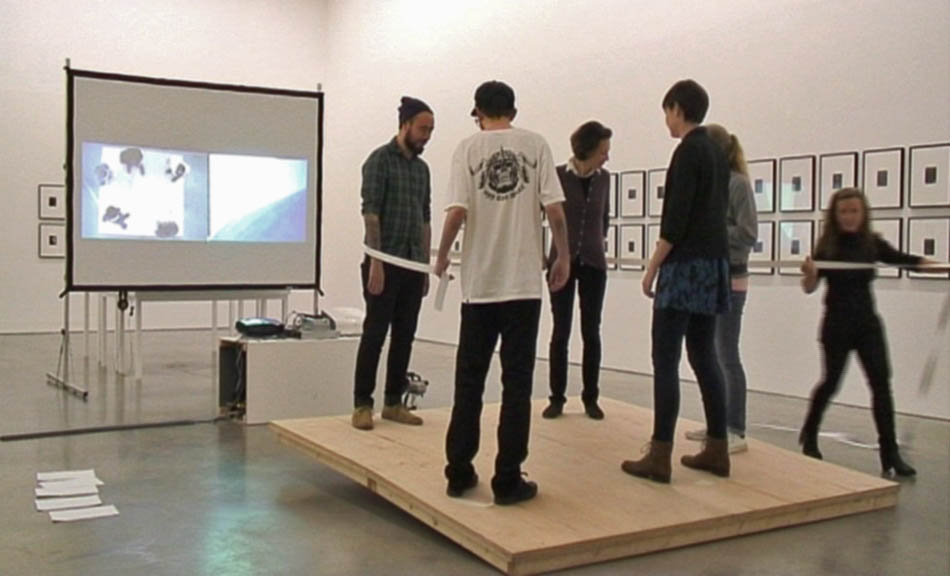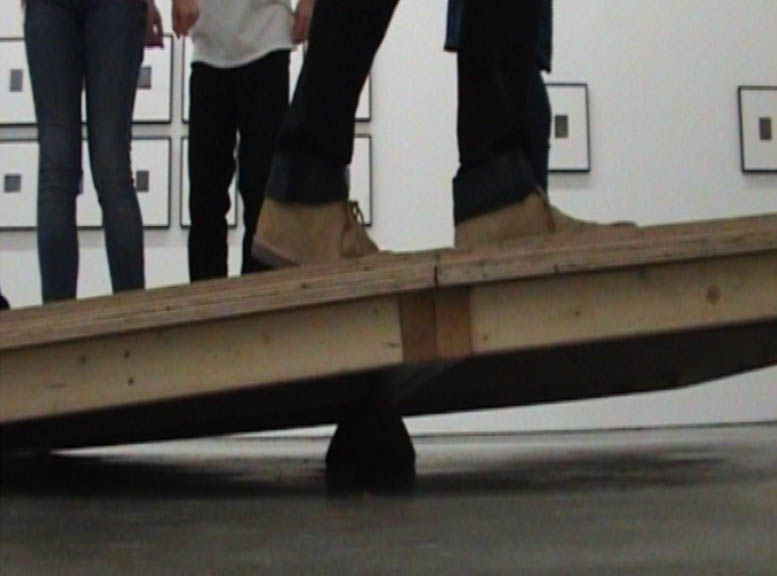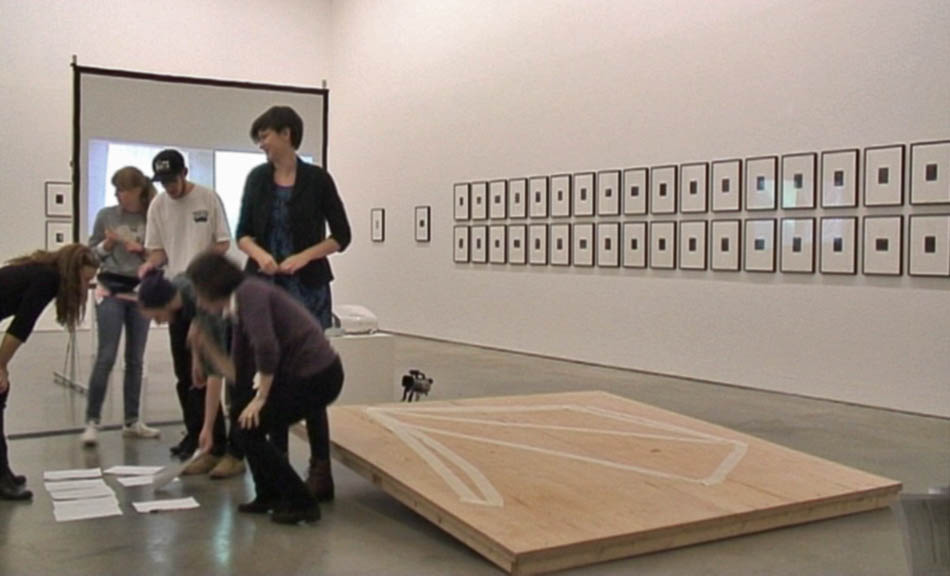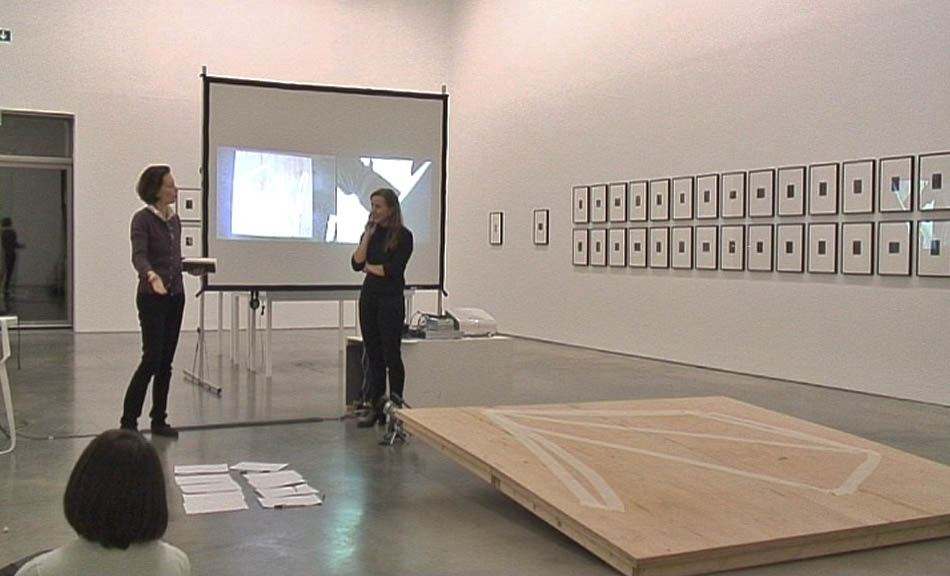Urban Interventions
Milton Keynes, SPA(E)CIOUS
MK Gallery, 25 October 2012
SPA(E)CIOUS, Dynamics of collective and individual experiences of space and duration within specious present, adopting technologies for enhancing audience engagement, while producing forms of documentation .
Elena Cologni in conversation with Helena Blaker
The discussion follows on from the Wysing Arts Centre’s event on 28 June.
This is a form of peripatetic participatory practice where produced and shared knowledge informs the artist’s creative process. This is based on the multidisciplinary approach of my current project Rockfluid, where site specific art practice is underpinned by elements of cognitive psychology and philosophy. Hence, here the relationship Memory – Time – Perception is informed by Bergson’s notion of the present within duration and as produced by the body in space , and by Merleau-Ponty’s reference to ‘sensation’ as the basis for knowledge . On the other hand the role of memory in the present is seen from a shared perspective (psychology and philosophy of science) including the definition of specious present as well as the nature of retention as involving perception of duration . The variable within this is an element of interference in our experience, which will vary every time Spa(e)cious takes place (e.g. an unstable platform).
The exercise creates the physical and psychological conditions to enhance an awareness of the perception of time and space through interaction in three parts, involving psychology, drawing, video and performance.
Participants will follow instructions, within this overall condition: audiences and participants can see two projections, one of the views is from above and the other view is from the remote cctv camera on one of the participants. The latter will record their movements within proximal space. They will experience:
1- Memory in the present. To focus on moving through space and retaining information. It is believed that by introducing an element of interference in space our awareness of the present condition is enhanced
2- How has digital time disrupted our sense of subjective time? The perception of time, subjective time (non measured time) and distance in specious present (the time duration wherein a state of consciousness is experienced as being in the present). The exercise will test how differently we experience distance within a set amount of time, depending on certain conditions.
3- How does technology effect our perception and memorization of place? by relating memory to our experience of space in time. Starting from the observation that there is a time distance between the now of perception and the after of the recollection, and a space distance between where we start from and where we return: What does ‘this’ gap tell us? Is such gap there at all? Starting from a memory exercise (participants to draw the walking activity from memory), this will highlight similarities and differences between our mnemonic archive and technology produced documents of personal space, which I shall call microphies.
SPA(E)CIOUS, is one of the outcomes of the project ROCKFLUID. This develops from a residency at the Faculty of Experimental Psychology, University of Cambridge (since March 2011), with a collaboration with scientist Lisa Saksida, with whom Elena shares a research interest in the relationship between memory and perception. The dialogue evolves and is highlighted by open events in front of an audience (eg. Science Festival 2011, Science Festival 2012 chaired by Caterina Albano), to inform the artist’s creative process. As the project develops, a particular focus has become the influence of interferences of various nature on the perception in the present of space and time. After a number of people have responded to a call for participation (Wysing Arts Centre Open July 2011) to suggest places in Cambridge to meet the artist and share related memories with the participants (October-November 2011), Cologni recollected those journeys from memory and produced a body of work including drawings and a public art intervention (which will be presented on 5th July 2012 at Anglia Ruskin University). The latter is based on peoples’ suggested locations in space as well as a game the artist used to play in her childhood. Throughout the project one of the driving concerns has been how technology has influenced our way of conceive space and mapping. Through her work Cologni wants to point attention towards the experience of physical space and in particular the space proximal to the body, in relation to other views to which our technology-filled life allows access (see ‘views from above’ video and text installation, Institute of Astronomy June 2012).
Background. Cologni claims (since her PhD, 2004) that her art research is part of the critique to the ocular-centric discourse within western philosophy, with reference to Martin Jay. Yet, the fascination she has for perception and its psychology, and geometry (all linked to the primacy of vision) is a recurring aspect in her enquiry. Her critical position is manifested through overturning given assumptions therein by adopting paradoxical formats, including: juxtaposing visual perception with physical positioning in space, drawing ‘proto-geometric’, non-exact shapes, setting up contradictory research hypotheses. In this context ‘SPA(E)CIOUS’ is built around a need to make the viewer aware of the space proximal to the body. This happens in relation to a technology- driven life where most of us become increasingly familiar with (and hooked into) the views form above (GPS, Googleearth, NASA satellites). This way of locating ourselves in the world offers a way to feel in control, which Cologni parallels to renaissance perspective systems, whereby the central focus perspective represents man and structures of power.
Biographies
Elena Cologni is studio artist at Wysing Art Centre and Artist in Residence at University of Cambridge, Faculty of Experimental Psychology and University of Hertfordshire. She studied at Brera Academy of Art, Università Statale in Milan (Italy), University of Leeds, and she has a PhD from Central Saint Martins College, London (1999-2004, Fine Art with Philosophy and Psychology). She was awarded from the Arts and Humanities Research Council for her Post Doctoral project at Central Saint Martins addressing issues of memory and liveness (2004-2006), Research Fellow at York Saint John University (2007-2009) when her work became primarily site specific and participatory (www.elenacologni.com/experiential). She was selected for a residency at Centre for Contemporary Arts Glasgow (2006), participated to Glasgow international (2008) and received funding from Arts Council of England for a project at Yorkshire Sculpture Park (2009). Her current residency is funded by Arts Council of England, Escalator Program through Colchester Arts Centre and is supported by the University of Cambridge and Wysing Arts Centre.
Helena Blaker trained as a visual artist and has worked since the early 1990s as a curator and writer, with a twin focus on performance in experimental film and on the history of performance in visual art. She has curated programmes for Tate Modern, the BFI, the National Theatre (with Public Art Development Trust) and Capture, has been in conversation with many artists over their work in performance across disciplines, has written on contemporary performance and on dance and visual art for Siobhan Davies Dance, PGCP and DTJ and Art Monthly, and has conducted a major research and publishing project for ACE/BFI on the histories of performance in the arts on film. For her, the rough quality of the recorded image of artists’ live actions from the 1920s to the 1970s, whether in still photography or video or film (before the wider development of moving image practice in contemporary art) may evoke a particular quality of live-ness that is appropriate to – or that creates an affective relationship to – the event that occurred in that earlier moment. However these images are only partial records, often randomly or spontaneously taken. And yet it is perhaps because of their roughness and apparent relation to the live – their apparent ‘immediacy’ – that these images have entered cultural memory and the cultural imagination. These evocative photographic and film records often stand in for the live event, offering a view of the artist’s work and a way in to the history of performance in visual art.
The subtle questions of documentation and the production of an image in relation to live experience (relating to history and to representation, rather than to consciousness as in Elena Cologni’s work) differ from the questions of time and space that may be conjured up in avant-garde film, where screen space and screen time bring up further issues of narrative and subjectivity.
This is part of Rockfluid, funded by Arts Council of England, Escalator Program, University of Cambridge, University of Hertfordshire.



